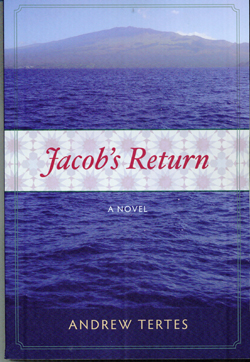Jacob ‘s Return by Andrew Tertes, Sapphire Ink Press, 2012, ISBN 989-1-938133-00-8; 440 pages, $15.95
By Donald H. Harrison

 SAN DIEGO –This novel’s title announces its outcome: Jacob, the main character, will return. Ah, but to what? The cover photo is of the ocean, presumably off the coast of Hawaii, where tragedy robs Jacob of a loved one. However, Hawaii isn’t the only option for return. Jacob also may find his way back to the craft, religious tradition and people that he has left behind in his search for self: his investigative journalism, his practice of the Jewish religion, even his children.
SAN DIEGO –This novel’s title announces its outcome: Jacob, the main character, will return. Ah, but to what? The cover photo is of the ocean, presumably off the coast of Hawaii, where tragedy robs Jacob of a loved one. However, Hawaii isn’t the only option for return. Jacob also may find his way back to the craft, religious tradition and people that he has left behind in his search for self: his investigative journalism, his practice of the Jewish religion, even his children.
Yes, Jacob returns, so if “how does it end” is your real concern in reading fiction, this book would be a bummer, in the same way that it would be pointless to read The Odyssey. Everyone knows that Odysseus finally made it home, and the title of this book assures us that Jacob also makes his return.
On the other hand, if you subscribe to the Emersonian concept that “life is a journey, not a destination” then you’ll find yourself accompanying Jacob as he experiences mystical concepts ranging from Native American mourning ceremonies to the shamanism of ancient Jewish tradition. And you’ll empathize with his desire, and that of his family members, to right wrongs, both ancient and modern. Why does it matter that land was stolen long ago from California’s and Hawaii’s native peoples? What is the danger of high-tech, sonar testing in the waters off Hawaii?
If there is an overarching theme to this book, however, it is the exploration of the spiritual connection between humans and animals. This is a subject for Jacob’s contemplation and action, whether at the “res”– the reservation of the fictional California “Salt Grass” Indians–or in a Thoreau-like wilderness on Hawaii’s Big Island where Jacob, mainly in solitude, reexamines nearly every important core belief.
There is exegesis on the Jacob stories in the Bible, among them his relationship with Esau, his dream of a ladder, and most especially his wrestling match. In the life of the fictional Jacob Goldman, one rabbi destroys Jacob’s sense of connection to Judaism, and another builds it back up. The two rabbis disagree sharply on the meaning of the story of the Golden Calf. Does Judaism really exclude humans from identifying with animals, as native peoples do with their totems? True, Jews can’t use animals as idols, or substitutes for God. But can they rely on animals as portals to reach God? One of the rabbis is named “Katz.” Guess which side of the argument he’s on.
Like life itself, Jacob’s Return is an uneven book. There are digressions, sub-plots, bright moments of clarity and dark moments of confusion. Perhaps at 440 pages, it is too long, trying to say too much. But, you should excuse the expression, bear with it. The journey merits patience.
This is Tertes’ first novel. Now living in Israel, this American expatriate in all likelihood will, in some fashion or another, explore some of the Holy Land’s subcultures. I, for one, will be waiting with interest for his next novel.
*
Harrison is editor of San Diego Jewish World. He may be contacted at donald.harrison@sdjewishworld.com